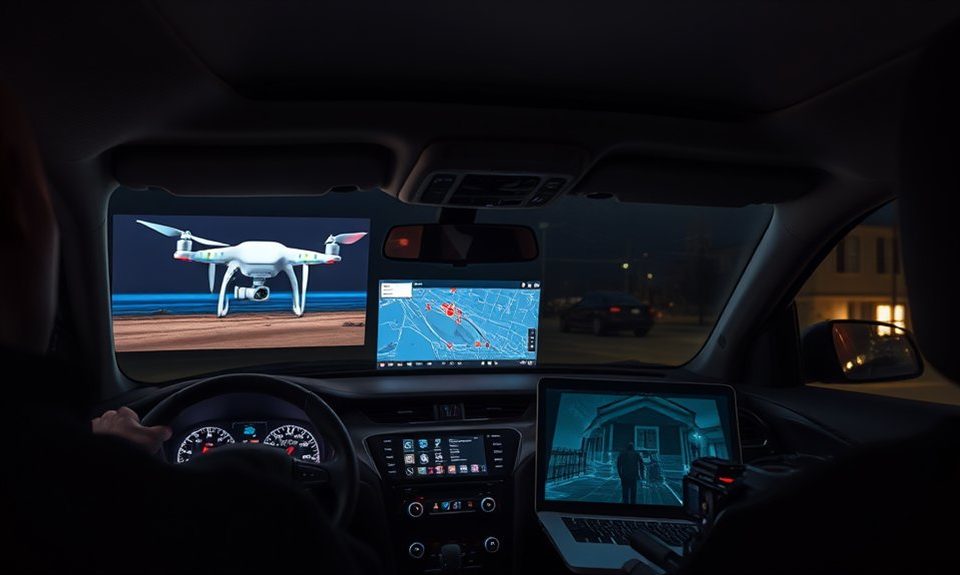GPS surveillance devices are legal for licensed private investigators to use in South Carolina without court orders, while law enforcement requires judicial approval. Private investigators must follow specific guidelines including avoiding installation on private property and using independent power sources. Devices cannot be permanently attached to vehicles and must be installed only in public spaces. Understanding the complete scope of GPS surveillance regulations ensures professional compliance and operational success.
Understanding GPS Device Legality in South Carolina
Three key legal principles govern GPS device usage in South Carolina surveillance operations.
First, licensed private investigators can legally utilize GPS devices without obtaining court orders, unlike police departments.
Second, investigators must follow specific guidelines regarding device placement, including avoiding installation on private property and ensuring devices are not permanently affixed to vehicles.
Third, GPS units must operate on independent power sources to maintain legal compliance.
These regulations establish clear parameters for surveillance professionals while protecting subject privacy rights. Additionally, companies like Stillinger Investigations rely on legal standards to manage their practices effectively.
Understanding and adhering to these legal requirements ensures both effective investigations and operational legitimacy in South Carolina.
Core Rules and Regulations for GPS Usage
Building on South Carolina’s legal framework for GPS surveillance, professional investigators must follow specific operational rules to maintain compliance.
The devices must operate on independent power sources and cannot be permanently attached to vehicles. Installation of tracking units must occur in public spaces, never on private property.
These guidelines ensure ethical surveillance practices while protecting both investigators and subjects. The devices must remain discreet and avoid causing any damage to the monitored vehicle. Moreover, adherence to ethical boundaries is crucial in maintaining the integrity of the investigation process.
The Evolution of Modern Surveillance Methods
Over the past decade, surveillance methods have dramatically transformed from labor-intensive manual tracking to streamlined GPS-based operations.
Traditional surveillance required complex “leap frog” tactics involving multiple investigators coordinating to maintain visual contact with subjects, often relying heavily on chance and timing.
Modern GPS technology has revolutionized these procedures, eliminating the need for complicated vehicle positioning and reducing the risk of losing subjects during transit.
This evolution has enhanced the efficiency and reliability of surveillance operations, allowing investigators to maintain consistent tracking while minimizing resource requirements and human error. Additionally, utilizing state-of-the-art technology for enhanced tracking capabilities ensures that investigators can gather reliable evidence seamlessly.
Benefits and Advantages of GPS Technology
The implementation of GPS technology has dramatically enhanced the effectiveness of professional surveillance operations.
GPS tracking devices provide investigators with real-time location data, eliminating the traditional need for complex vehicle rotations and multiple-agent surveillance teams.
This advancement delivers superior value to clients by reducing operational costs while maintaining consistent tracking accuracy.
Unlike conventional methods that relied heavily on timing and chance, GPS technology ensures continuous monitoring without the risk of losing subjects during transit.
The technology’s self-contained power supply and discreet installation capabilities make it an invaluable tool for modern surveillance professionals. Additionally, professional investigators are equipped with tools and techniques that complement the use of GPS, even further optimizing the surveillance process.
Professional Guidelines for GPS Implementation
Professional implementation of GPS surveillance requires strict adherence to established legal and operational guidelines.
Private investigators must ensure devices operate on independent power sources and are placed on vehicles only in public spaces. The equipment cannot be permanently attached or cause any damage to the subject’s property.
Licensed investigators must maintain discretion throughout the surveillance process while following South Carolina’s specific regulations. Additionally, ensuring effective bug detection is crucial to prevent unauthorized surveillance and protect client privacy.
Unlike law enforcement agencies, private investigators can deploy GPS devices without court orders, though they must still operate within defined legal parameters to protect both the investigator and client.
Conclusion
GPS surveillance devices represent a powerful tool in modern private investigations when used within South Carolina’s legal framework. While licensed investigators can deploy these devices without court orders, adherence to strict operational protocols remains crucial. As technology continues to advance, GPS tracking offers enhanced efficiency and accuracy, revolutionizing traditional surveillance methods. Understanding and following regulatory guidelines ensures both legal compliance and professional success in surveillance operations.






